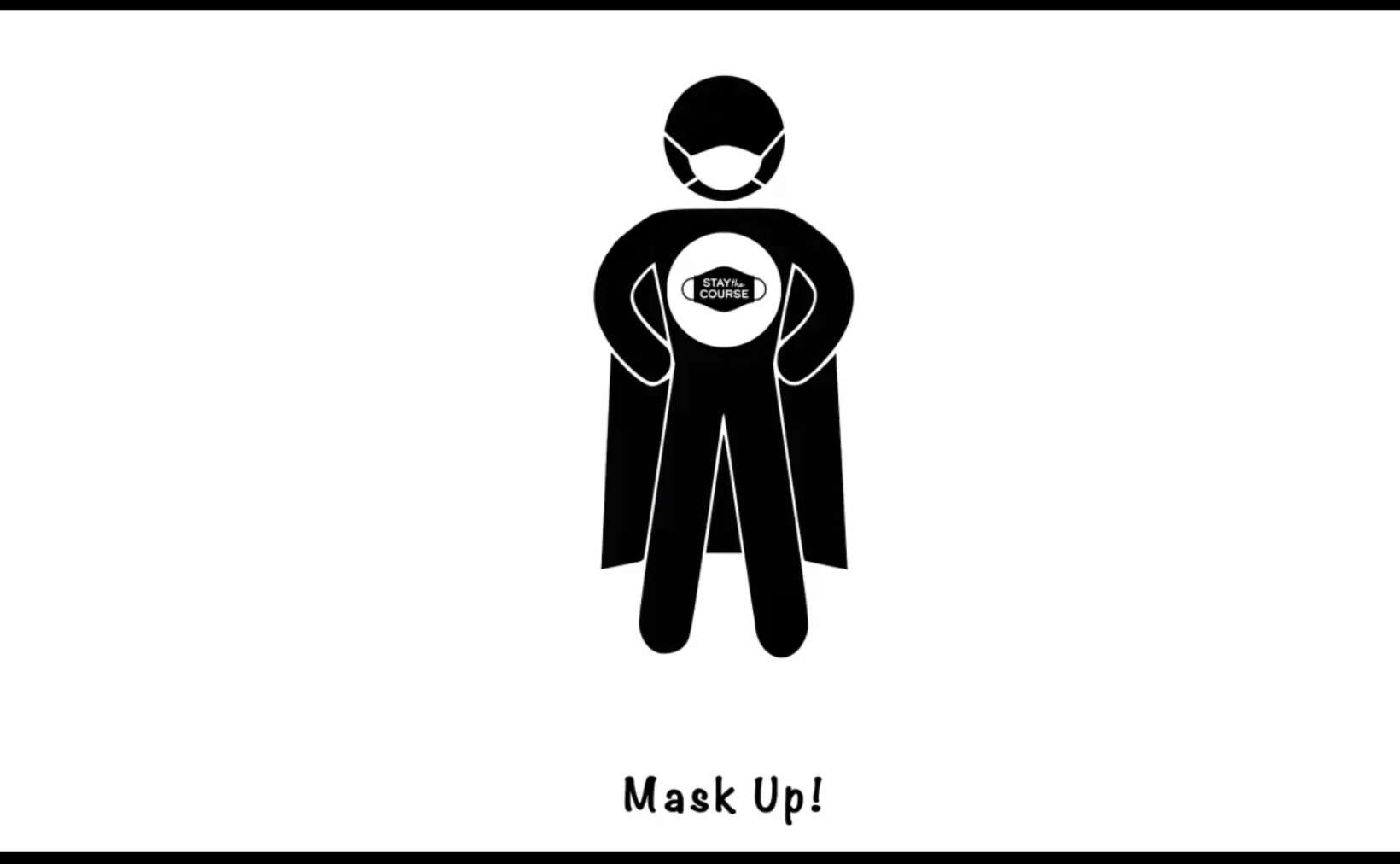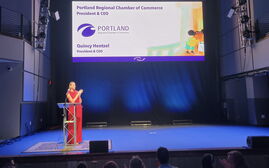
Processing Your Payment
Please do not leave this page until complete. This can take a few moments.
Portland's cultural community ‘check-in’ reveals business hardships, also optimism
 Screenshot / Courtesy, Creative Portland
Dinah Minot, top, executive director of Creative Portland, and Kate Anker, founder of Running with Scissors Studios and president of Creative Portland’s board of directors, discussed impacts of the pandemic on the city’s arts and cultural community.
Screenshot / Courtesy, Creative Portland
Dinah Minot, top, executive director of Creative Portland, and Kate Anker, founder of Running with Scissors Studios and president of Creative Portland’s board of directors, discussed impacts of the pandemic on the city’s arts and cultural community.
The story is mixed for Portland’s arts and cultural organizations and individuals as they navigate the pandemic.
Some in the visual arts have pivoted to online offerings, outdoor public works and limited gallery hours. The performing arts have had a tougher go.
The challenges could worsen during the coming autumn and winter months, said Dinah Minot, executive director of Creative Portland, the city’s nonprofit arts agency.
Minot moderated an arts and culture webinar Tuesday that called on a variety of cultural leaders in Portland to share what’s happening at their nonprofit organizations and businesses.
“We’re mindful of the challenges ahead for all of the artists and arts organizations,” she said.
A Creative Portland survey in July revealed that almost half of the cultural organizations in Portland are operating online only. A small number are open in brick-and-mortar settings with limited hours; others are closed completely.
“The past six months have been hard on us all,” said Kate Anker, founder of Running with Scissors Studios and president of Creative Portland’s board of directors.
Running with Scissors offers studio spaces and equipment to 75 member artists. It closed down for over two months, reduced staff hours and lost 23 members and will probably lose a few more by the end of the year, Anker said. It lost 30% of revenues compared with the same time a year ago. The organization was planning to open an in-house gallery and store but had to put the project on hold. In mid-June, the facility reopened to members and over the past month has seen artists moving back in.
“We’re slowly starting to rebuild,” Anker said. “We’re hopeful about all of this.”
Cultural app
Creative Portland has been closed since March, furloughed its staff and suspended its in-person programs, such as First Friday Art Walks and its in-person art gallery. Among its initiatives, the organization moved art showings to an online gallery and is developing a cultural digital application designed to be a one-stop shop for consumers to learn about events and individual artists.
Users will be able to download the app for free. Depending on their membership, artists will be able to sign up for various features, such as an “augmented reality” feature and other visuals that will tie to physical locations.
“The purpose of these digital tools we’re proposing is to increase the visibility of the arts and cultural organizations and local artists of Portland,” said the app’s developer, Sam Mateosian, co-founder of Big Room Studios and the Yarn Corporation, both of them creative technology companies.
The goal for Creative Portland's cultural app, he said, is to increase visibility in order to drive more attendance and engagement with the arts, both among local arts patrons and visitors to Portland.
Mateosian said he was optimistic that the arts would rebound as they emerge from the pandemic. As that happens, the app will continue to be useful for rebuilding attendance and rebuilding the arts economy, he said.

Struggling in the moment
The Portland Museum of Art has “struggled to figure out what our footing is in this moment, said the museum’s director of communications, Graeme Kennedy.
The museum reopened mid-June and was one of the first cultural organizations in the region to do so, he said. Throughout, he added, the museum has been looking at how to navigate the moment. The museum has long had a digital presence.
“This crisis pushed us to think through that even more,” he said.
That included putting exhibitions and didactic materials online in robust ways that would engage consumers, he explained.
“That means a lot of content production for us,” including online cultural activities and marketing materials, he said. One example is development of a webpage called “Dream Action Factory” that explores incarceration during COVID-19 and beyond.
SPACE Gallery in downtown Portland also turned to virtual offerings, said the organization’s executive director, Kelsey Halliday Johnson. After canceling over 50 events, it’s since offered about 25 virtual activities, including film screenings and artist talks.
“We pivoted to make sure we continue to make Congress Street the heart of the arts district,” Johnson said. “We made our building into a series of public arts projects.”
Portland Ovations is currently operating on a budget that’s 35% of its normal budget, said the organization’s executive director, Aimee Petrin. The organization’s lease was coming up for renewal so it’s moved out of its offices entirely, with staff working from home. Operating in the digital sphere, it has an number of programs running concurrently, is working with national and international artists in a digital format, and is looking at ways to provide digital arts integration in homes and schools.
‘Devastating’
The State Theatre shut down in March and remains closed, said its general manager, Lauren Wayne. All part-time staff and half of the full-time staff were laid off. Also impacted were contractors such as food vendors and cleaners.
“It’s been devastating to all the local venues here and to the music industry in general,” Wayne said of the pandemic.
Owned by the same group, the Port City Music Hall, a performance space in downtown Portland closed permanently in July.
“It’s been pretty rough,” said Wayne.
She added, “When you’re staring at paying rent on a room that’s dark for a year, that’s a black-and-white decision.”
The State Theatre had its rent deferred until it can reopen, she said.
“”That’s tremendously helpful, but it will take us years to get out from that,” she continued. “It makess no sense to reopen on a restricted capacity.” The theater’s business model depends on selling 1,000 to 1,900 tickets at an average price of $35. It’s unable to make the numbers work with 50 or even 500 attendees, she said.
“All of the touring industry is shut down, too,” she added.
It could be a year or more before touring can begin again, she said.
“Everything is pretty unknown for our industry,” she said.
The theater has done some livestreaming of acts, which is a way to keep artists working but doesn’t generate revenue for the theater, she said.
“That’s been really fun, and heartbreaking too,” she said.
Recently, music venue owners and operators organized the Maine Venue Alliance to present a unified voice.
“That was a last-ditch effort to try and raise funds for the small, really struggling venues that are not doing great,” Wayne said.
The alliance launched a fundraising campaign with a $250,000 goal to help certain venues struggling to keep the doors open. The campaign has raised $27,000 so far. The alliance will shift to soliciting corporate donations, said its co-founder, Scott Mohler.
“One the biggest services we can do is educate the public that there are people behind these businesses,” Mohler added.
Jeff Shaw, executive director of the Maine Academy for Modern Music, said the educational institution had good outcomes shifting to remote learning, an option the academy had long been considering anyway.
“Most of our students were able to do that,” he said. The academy also hosted in-person summer camps on a small scale, using Plexiglas screens and keeping the windows open. Now it’s offering a mix of online and in-person programming and retraining its staff to operate in the hybrid environment. But the academy lost its events and sponsorships.
“We’re adapting and trying to be optimistic and creative” and develop workarounds, Shaw said.
“Businesses are struggling and the arts and cultural community and organizations are no exception,” said Quincy Hentzel, CEO of the Portland Regional Chamber of Commerce. “We’re doing whatever we can to work collaboratively with Portland’s creative organizations that have so much and, in some cases, endless need. Or mission now is to pave the way for recovery.”
Hentzel continued, “The arts is an economic engine within our economic engine of Portland. You’re a critical part of our workforce and our economy.” That includes the trickle effect of when there’s a show in town and consumers also pay for parking garages, restaurant meals, hotels and perhaps catching another show or museum while they’re in town.
Then there’s the larger effect.
“The arts and the vibrant cultural life in Portland attract people to live and to work in Maine,” Hentzel said. “We have that cultural life and we need to make sure it remains active.”














0 Comments